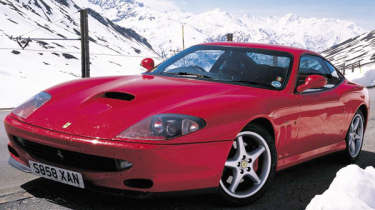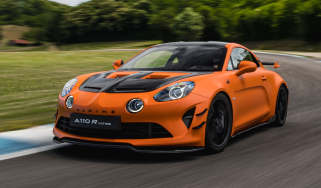Six ways to beat the taxman
Your road tax bill is about to soar, but all is not lost for fast car fans
Hammer the motorist. Always, it’s hammer the motorist because the motorist will always pay. The 2008 Budget, though, seemed unusually draconian for those who don’t drive cars designed to deprive hungry plants of their carbon dioxide. Vegetarians should be every bit as concerned as gas-guzzling motorists.
Now, let’s get one thing straight. We keep hearing in the media about gas-guzzlers, a perjorative term which suggests that such cars deserve all the fiscal bombardment they can get. The magic figure is 225g/km of CO2, above which road tax rapidly gets more expensive. It’s also the figure beyond which a car entering London’s congestion charge zone will, from October 27 this year, be liable for a charge of £25 a day instead of £8.
Yet 225g/km equates to about 30mpg for a petrol car, slightly more for a diesel. And not so very long ago, 30mpg was considered quite economical for a normal-size car. It’s amazing how perceptions shift – and it’s also amazing how many people genuinely expect to get the official ‘combined-cycle’ average mpg from their own cars all the time, regardless of how they drive.
So pity the downtrodden gas-guzzler. But there’s another strand of media misinformation that howls about how standard family cars will be penalised, one example being a Ford Mondeo 2.5T. Well, very few people buy that range-topping version, besides which it’s under 225g/km anyway. The fact is that of new cars sold, few are nowadays over 225g/km.
Unfortunately, people like us are more likely than most to champion those few. As you can see from the table, for all cars registered after March 1, 2001, once past 225g/km, road tax gets very expensive: between now and the next Budget it’s a jump from £210 to £400 – but only, bizarrely, if your car was registered on or after March 23 2006 (the date of the Budget two years ago, at which the 226g/km-and-over band was introduced). If it’s older, it stays in the £210 bracket. For now…
In the 2009-2010 financial year it gets worse, rising to £415 or, if your car is in the new over-255g/km to be introduced then, £440. And your pre-March 23 2006 gas-guzzler loses its charmed status. More insidiously, an increase in the number of bands to make a more finely-graduated scale means that cars near the top of a previous band might now be in a more expensive one. For example, a car emitting 224g/km is currently liable for £210 tax, sitting at the top of the 186-225g/km band, but next year it will cost you £300 as it sits at the top of the new 201-225g/km band.
And now more bad news, designed to put people off buying high-CO2 new cars so that their numbers gradually diminish. In the 2010-2011 financial year the rates rise again in approximate proportion, except for those cars emitting 120g/km or less whose tax remains the same – zero in the case of an up-to-100g/km car, which currently means a base-model Volkswagen Polo Bluemotion.
But new cars bought in that year will be charged a specially high first-year tax if they emit 161g/km or more. For a car at that 161g level the tax will be £250 instead of £180. For a car over 255g/km, the tax will be a hefty £950 instead of £455. However, buy a car producing 130g/km or less and there’s no tax to pay for the first year.
It’s complicated, but the fact is that those wealthy enough to buy the big, expensive cars rated at over 255g/km will probably be able to afford the increases. The problems will arise when these cars enter the secondhand market and come into the reach of less affluent individuals. That’s when the cost of road tax will bite, reducing demand for the cars and sending their values plummeting.
There’s also a chunk of cars in the evo orbit which emit over 225g/km but under 255g/km, and it’s these whose owners are hit hardest. The biggest tax jump from one band to the next is the one into this band. Currently it’s a £190 jump, and even under the revised, closed-up banding starting next year it’s a £115 leap. So that’s the Subaru Impreza STI, the BMW 335i, the Porsche Cayman and the Audi TT V6 penalised, all of which will attract a £750 tax in their first year if bought new in 2010-11 or £430 if already registered.
If you want a fully-certified new car you’ll have to grin and bear it, but there are some ways round the system. Buying a car rated below 226g/km is one of them, such as a Lotus Elise, any BMW 3-series other than a 335i or an M3, or any good hot hatch with no more than five cylinders. Click on the images for our taxman-beating pointers.




